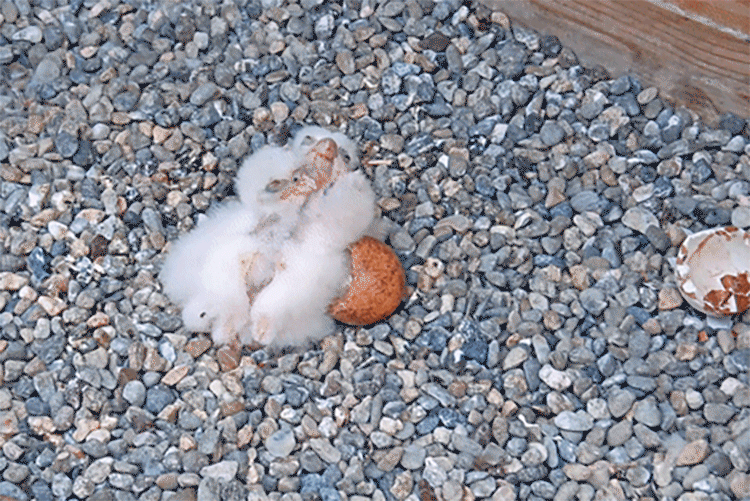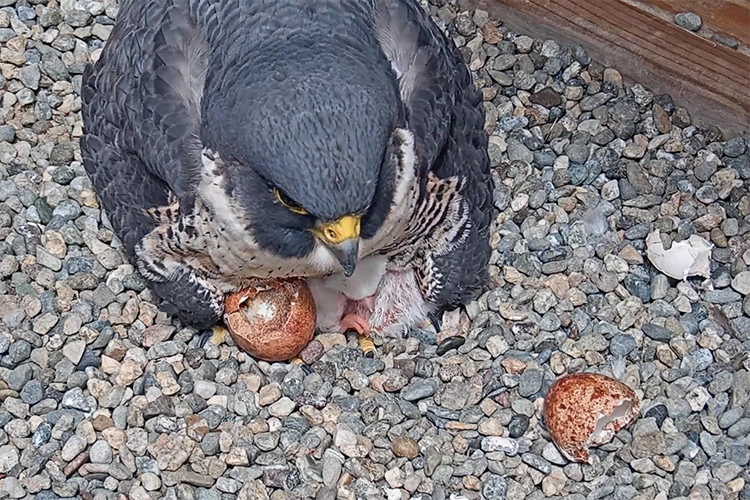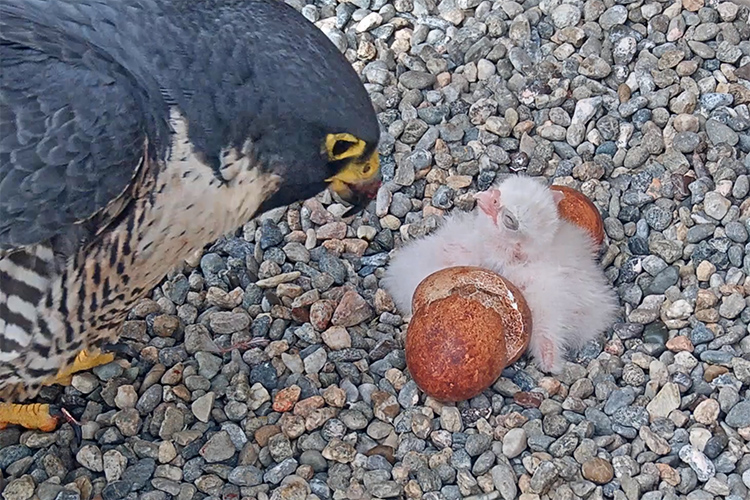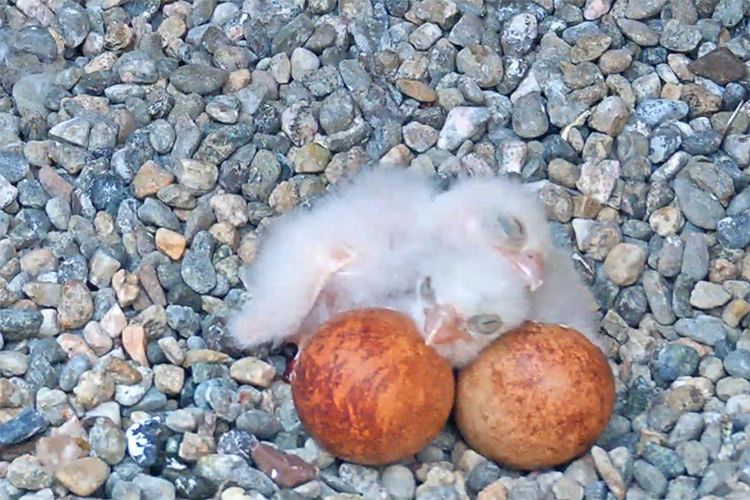Triplets in the tower: Berkeley’s falcon family grows
Contest to name the chicks will begin in a few weeks
April 20, 2020

Annie feeds her three hungry chicks on Sunday with meat from father Grinnell’s hunting expedition. He left a dead bird on a ledge near the nest, and Annie retrieved it to give to the chicks in small pieces. The dented egg that wasn’t viable can be seen next to the chicks. (Cal Falcons photo)
Two hatched on Saturday, the third on Sunday, their bodies wet from the fluid within the reddish-brown eggs that had been their home. But underneath their mother, Annie, the peregrine falcon chicks’ initial layer of down feathers soon dried and fluffed, and the babies began vocalizing in the open air in their sky-high nest on the Campanile.
There had been four eggs; one, broken recently, was non-viable.
“Even two chicks is a successful nest for a peregrine falcon,” said Sean Peterson, a Berkeley Ph.D. student who, with his wife, biologist Lynn Schofield, runs the successful Cal Falcons social media project. The couple, who celebrated the births by baking a batch of cookies, hosted a one-hour Hatch Day Q&A on YouTube on Saturday afternoon for an audience of about 500 people.
Earlier that day, more than 1,000 viewers saw the second chick hatch — double the viewership for last year’s Hatch Day, which was shown on the big outdoor screen at the Berkeley Art Museum and Pacific Film Archive. This year, because of the COVID-19 social distancing mandate, the hatching was livestreamed via the 24/7 webcam focused on the nest in the bell tower.
Peterson and Schofield fielded a wide range of questions, including from children and viewers overseas, in their first-ever Q&A about falcon parents Annie and Grinnell, who began setting up their territory on campus in 2016, and their chicks. Since 2017, chicks have been raised on the tower; Annie and Grinnell live there year-round.
Asked how fast the newborn chicks will develop, Peterson and Schofield said the birds will be able to see and will double in size in five days and that they’ll start their next set of feathers after 10 days. “By about day 40,” said Peterson, “they’ll pretty much be fully-feathered and ready to go, to start learning to fly.” Right now, the chicks’ downy fluff helps keep them warm, and soon, when they can stay warm without their mother, Annie will help Grinnell hunt for the family’s meals.
“Trying to stay warm is one of their main instincts at this age,” said Peterson, explaining why the chicks sleep in a pile. “Getting too cold can be very dangerous.

Early Monday morning, April 20, the chicks ready for a nap after finishing breakfast in their nest on the Campanile. They stick close to each other to keep warm, one of their biggest challenges at this stage. (Cal Falcons gif)
The genders of the triplets won’t be known until they are banded in the first or second week of May.
Do the falcons have taste buds? “The answer is yes,” said Peterson. And is it true that Annie was seen eating egg shells after the chicks hatched? “This is a fairly common behavior,” he said. “Birds do this to help regain some of the calcium that they use to form the eggshell.”
As for what the chicks will eat during their first few weeks of life, Peterson said they’ll be fed small pieces of bird meat from their parents — peregrine falcons kill their prey in mid-air and can fly up to 250 miles per hour, faster than any animal on Earth. Eventually, he said, the young “will be fed bigger chunks of bird with bones and other non-digestible material, and then eventually eat full birds that they themselves catch.”
A child who’d been watching Annie on the livestream asked if it was true that she ate her chicks’ poop. “Yes, she was eating it,” said Peterson. “It’s a behavior called coprophagia that’s performed by a lot of birds. Baby birds don’t have a great digestive system, so their poop is actually nutritious. One of best ways to get rid of their poop is (for the parents) to just eat it.”

On Saturday, Annie warmed and protected her first two chicks after they hatched. (Cal Falcons photo)
Peterson and Schofield also were asked whether the young birds would be banded, so they can be identified throughout their lives, wherever they migrate. The couple said they hope to band the chicks the first or second week of May.
“When we band them is based on when the chicks have fully-formed legs,” said Schofield. “One of the first things to get full-sized are their legs.” She added that, since COVID-19 precautions have shut down much of the campus, “access is more restricted for us; we might not get to band the birds.”

On Saturday, falcon mother Annie checks out her first two offspring. (Cal Falcons photo)
Viewers asked about the dangers associated with the young birds learning to fly off the tower.
“It’s the most dangerous part of the peregrine falcon’s life,” said Schofield. “Their first flights are very awkward. Luckily, last year, both birds landed on other buildings on campus … and there’s the potential for them to hit a building. Also, if they hit the ground, the fear is that they’ll have a hard time getting up.”
Peterson added that “about 40% of raptors that fledge make it to their first year alive— there is a high mortality rate. They also have to learn how to hunt, successfully hunt, and to migrate successfully.”
Do peregrine falcons mate for life? “Kind of,” said Peterson, “Often what will happen is that, later in life, a new male or female will show up and drive off the older male or female falcon, and then the older one will mate with the new bird. Grinnell might disappear one year, and a new male would mate with Annie. Then Annie might disappear a few years later, and there would be a new male and a new female” taking over the nest.

The first two baby peregrine falcons born last weekend nap on top of each other. (Cal Falcons photo)
A question surfaced about whether the campus has other nesting raptors. Peterson said there is a red-shouldered hawk nest on the west side of campus and another on the eastern side. There once was a Cooper’s hawk nest at Berkeley, he added, but whether it’s still active isn’t certain. And, there’s a great horned owl nest on Strawberry Creek, on the campus’s north side.
As for great horned owls, they are predators of peregrine falcons, the couple said, and that’s why a lot of falcons thrive in cities, choosing to nest on buildings that are “difficult to access and impossible for predators to reach. They take the safest spot over the comfiest,” said Schofield. “That’s one of the benefits of the Campanile.”
But what about the carillon, and its loud bells? Don’t they annoy the birds?
“Apparently not, they chose to nest there,” said Schofield. “On our (Cal Falcons) YouTube highlights, there was a carillon concert while Annie was taking a nap, and she’s very relaxed. The benefits of having their nest (on the tower) far outweighs the annoyances of the bells and the lights that are on the Campanile.”
What will the triplets be named? A Cal Falcons naming contest is coming up, likely the second week of May. It will be open to the public.